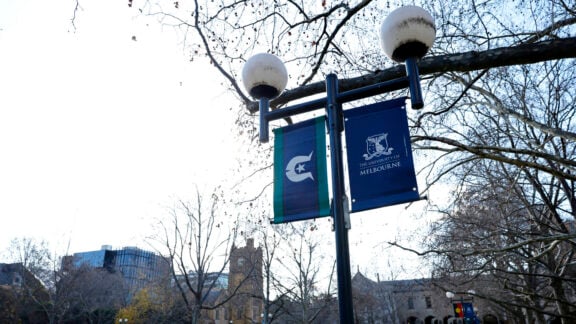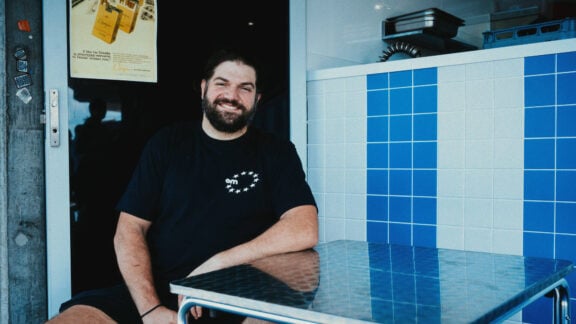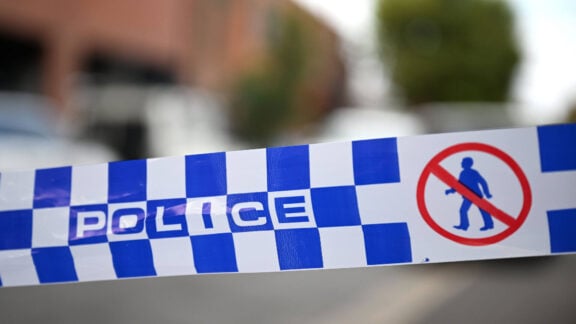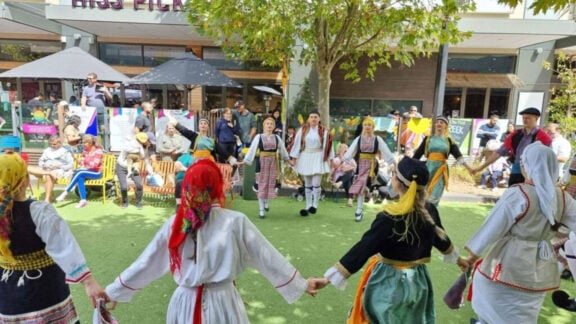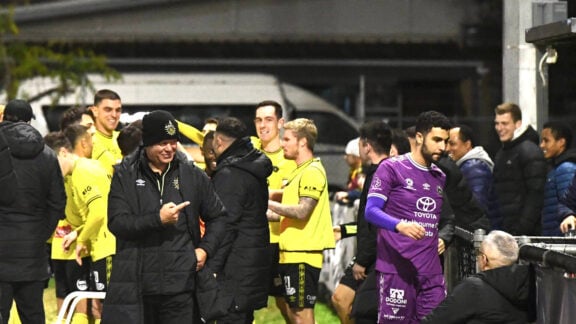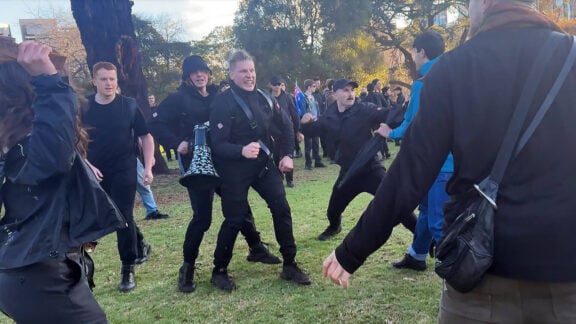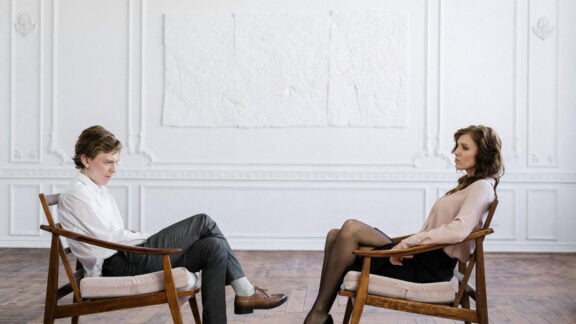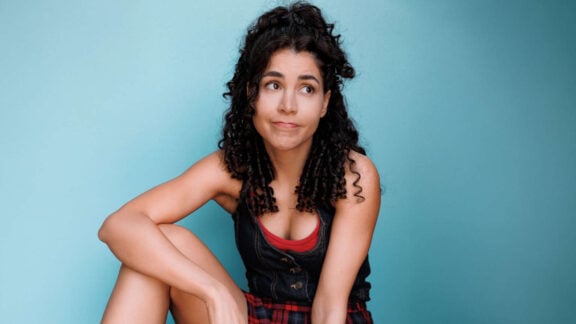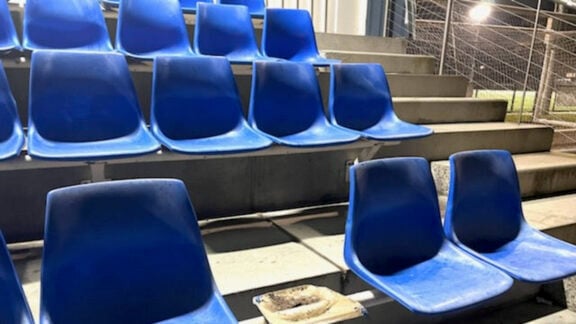Community football clubs have united against a Moreland Greens councillor led campaign targeting synthetic sports surfaces.
On Thursday night, Moreland Council’s Greens put to rest their campaign to ‘Turf Out Fake Grass!’, after a successful counter-protest by community football clubs culminated in a ‘Save our Turf’ protest on Wednesday night. The Greens’ target was Clifton Park FC synthetic pitch.
An allocated budget of $650,000 by Moreland Council for the resurfacing of the Clifton Park synthetic ground is not enough to make it natural, according to a local club president
Greens Cr James Conlan was accused of “selling unicorns” by Brunswick FC president Carlo Carli, after he suggested that the Clifton Park pitch can be converted to grass for $650,000.
Labor Cr Lambros Tapinos said that the Clifton Park pitch sits on top of a metre of concrete, and he agreed with the presidents of the Brunswick SC and Brunswick Zebras FC, that it would take over $1m and “that does not include maintenance, watering, and pesticides.”
The brouhaha between community football clubs and the Greens ignited when local activists affiliated with the non-profit Sweltering Cities, began a campaign led by Greens Cr Angelica Panopoulos against synthetic pitches, characterised as having “the detrimental effects on human health and the natural environment”.
The clubs rely on the few synthetic grounds for training. They believe that without them they would not be able to provide the access to children, young adults, and families to participate in their beloved sport, soccer.
Neos Kosmos contacted the Mayor of Moreland Cr Mark Riley and asked why the Greens flipped on the issue.
“I don’t understand what you mean by ‘flipped'” said Moreland’s Mayor to Neos Kosmos.
“All I did is put forward a motion at the council’s meeting” on August 10 requesting “a report and development of a policy on sustaining and managing our sports field surfaces.”
The motion he said was “supported by all the councillors”.
The report wants to “give consideration to the council’s stance on the climate emergency, integrated water management, urban heat Island effect” and their goal of zero waste by 2030 and will cost rate payers at least $30,000.
The motion became a pivot for Greens Cr Angelica Panopoulos, and the other Greens, to launch the ‘Turf Out Fake Grass!’ campaign along with a group of local environmental activists.
The campaign had Clifton Park FC’s synthetic pitch in its sights – a pitch used by 16 local community teams for training to not overuse their natural pitches.
Mayor Cr Riley said he knew nothing about the club protest. He added, “why would anyone be angry given it was a motion that was passed?”
Asked why he thought the community football clubs were fuming Cr Riley said, “I don’t know you need to ask them.”
Neos Kosmos told the mayor that we had talked to club presidents who felt the Greens had no understanding of the value of community football for children, immigrants, and refugee communities.
Neos Kosmos conveyed that club representatives, like Carlo Carli, the president of the Brunswick Zebras FC, characterised the Greens’ campaign as “highjacked by eco-fascists”.
“I don’t understand what that means,” bristled Cr Riley, and added that he “understood the importance of sport to the community.”
“I sense some people have characterised this motion in the wrong way, all I did is put forward the motion for sustainable community sporting facilities.”
Asked about the campaign by his fellow councilor Cr Angelica Panopoulos, the mayor said he was not “across the detail today.”
When told the campaign had been running since August 23, the mayor repeated that he was “not across the detail.”
Cr Panopoulos on August 23, posted on Facebook that the motion by the Greens had “paid off.”
Her post a Sweltering Cities post reads, “After listening to the concerns of local activists, Moreland (Merri-bek) council have decided to look into the harms that fake grass and other synthetic surfaces have on the community.”
“The primary focus will be on sports fields (like Clifton Park, where we held our campaign launch).”

Neos Kosmos asked Cr Riley, if he as the mayor of Moreland, shouldn’t be across issues that concern his constituents, especially if they arise from his councilors’ actions. Cr Riley abruptly ended the terse conversation and hung up.
“It is amazing denial” said former Victorian Labor minister and president of the Brunswick Zebras Carlo Carli about the Moreland mayor’s responses.
While the mayor said he did not know what the Save our Turf protest was about Cr Conlan attended the protest on Wednesday to gauge community sentiment. Cr Panopoulos has gone to ground, regardless of spearheading the anti Clifton Park synthetic ground campaign.
Neos Kosmos contacted Cr Panopoulos, but she was reticent to talk, and issued statements instead.
“England just hit 40 degrees Celsius, here in Melbourne we’ll see even hotter days more often.”
“On a hot day, synthetic turf can increase land surface temperatures by 40 per cent or more. When we have 45-degree Celsius summers, this isn’t safe for kids or anyone to play on.”
Neos Kosmos spoke to Peter Kyriopoulos, the President of the Brunswick City SC at the protest staged by community football clubs on Wednesday night against the Greens’ campaign.
“We all came together tonight to show solidarity and demonstrate that the kids need this pitch, we’ve got to stick together,” said Mr Kyriopoulos.
Mr Kyriopoulos said that there are only “two synthetic football pitches in the whole of Moreland City Council. That’s two all-weather pitches shared between 16 clubs.”
This action against the synthetic pitches was affiliated with the Sweltering Cities an activist organisation concerned by “the detrimental effects on human health and the natural environment” they attribute to fake grass.
The President of the Brunswick City SC said, “Both wet weather and periods of drought have rendered Clifton Park’s synthetic pitch an invaluable resource for our sporting community.”
“This year football’s ability to cater for the growing demands of natural playing fields have been tested, compounded by poor maintenance and repair of our natural turf grounds.”
He said that Greens councillors’ aim was “to ban all synthetic surfaces from schoolyards and play areas to sporting grounds in the municipality.”
“They say Clifton Park’s synthetic pitch has become an issue since it’s been slated for upgrade or replacement in the next financial year.”
“The Greens didn’t protest at a tennis court, or a playground, they chose our football pitch.”

The Moreland football community demands’ are, that Clifton Park’s synthetic pitch remain and be upgraded as a part of the areas sporting infrastructure. And that council test the carrying capacity and costs of the natural field that is being proposed on another one of the many football fields in the city.
Mr Kyriopoulos said that AFL Clubs are getting “budget allocations large enough to build new grandstands, and our natural turf grounds aren’t even up to code. They’re not being maintained.
“We’ve had an unprecedented number of injuries this year due to the state of our natural pitch. And that comes down to council not fulfilling their commitment to maintain.”
Neos Kosmos talked to Moreland Labor Cr Lambros Tapinos who said that the Greens seem to have “missed the mark on this issue.”
“The importance of soccer clubs, and other codes, is their ability to create health and well-being in society. These clubs have youth teams, women’s teams and open up to new arrivals and refugees, they play a key role in equity, access and social cohesion.”
“These community based clubs engage migrant and refugee families who find release in these social networks, that are so critical for them through sports clubs” Cr Tapinos said.
He underscored the “social reasons” especially after the Covid pandemic lockdowns and the “importance social interactions.”
“For a lot of people, the club becomes a second family, it’s a place where you can go and catch up with friends, it’s great for the people the players, it’s also great for the parents as well on a social level. It means you get interactions, and events occur within social clubs,” Cr Tapinos told Neos Kosmos.
Community football clubs consider their activities critical for children, on their physical and mental health.
“If you have children, you know that you will spend ten years of your life going to Sunday games, or in gymnastics – it is incredibly important for family, community and social development,” said Mr Carli the president of Brunswick Zebras FC.
Mr Carli said that it seems the Greens “do not get the importance of community sports to migrant and refugee communities”
Moreland (Merri-bek) is one of Melbourne’s most multicultural inner suburbs – settled by Greeks, Italians, Lebanese, Indians, Vietnamese, and many other groups. Moreland has over the last ten years become a hub of regentrification by new professionals and creatives.
Migrant community organisations, in the form of community football clubs seem to have become wedged against the new urban elites and activists moving into the area.

